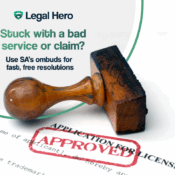
Declaration as Unfit to Possess a Firearm
As we commemorate Workers’ Day in South Africa, it’s essential to recognise the role of Police Officers in protecting the rights of workers. However, the use of firearms by Police can sometimes result in tragic consequences, especially if used inappropriately. As a Police Officer, it’s important to understand when you can be declared unfit to possess a firearm. By upholding the highest standards of professionalism, the Police can create a safer and more just society for all workers.
There are circumstances that may cause you to lose your firearm/ firearm license
Pointing of a firearm at someone * Threatening to use a firearm against another person or your partner / spouse * Misplacing/ losing your firearm * Using your firearm whilst under the influence of alcohol or narcotics * The Court granting a protection order against you *
The aforementioned circumstances could possibly lead to a Section 102 Notice in terms of the Firearms Control Act, 60 of 2000. This notice must be served on you and the purpose of such a notice is to determine whether you are still fit to possess and use a firearm.
How does a Section 102 Notice work?
- Mr. Apple cannot find his firearm;
- Mr. Apple has a duty to report the missing firearm within 24 hours;
- The South Africa Police Service opens a docket and institutes criminal proceedings against Mr. Apple through a State Prosecutor;
- In this example, the State does not have a strong case against Mr. Apple and therefore withdraws the criminal prosecution;
- A couple of weeks after the withdrawal, a Police Officer serves a notice on Mr. Apple in terms of Section 102;
- Section 102(2) of the Act requires that the notice is served on Mr. Apple by hand. The notice calls on Mr. Apple to appear at his local Police Station on a specific date and time in order to produce reasons and arguments as to why the Presiding Officer of the hearing should not find him unfit to possess a firearm;
- At the hearing there will always be a charging Police Officer who acts as a “prosecutor”, and a Presiding Hearing Officer who must hold the rank of Captain in the South African Police Service, or higher;
- Each Police Station has its own set of rules on how to conduct the hearing. Normally, the Charging Police Officer will read the charge(s) against Mr. Apple; thereafter, the Police will call their witness(es) to testify against Mr. Apple and thus present its case;
- In terms of Section 102(3) Mr. Apple has the right to be represented by his attorney at this hearing. The attorney will then cross-examine the state witness(es) in an effort to discredit their evidence;
- The Act requires that Mr. Apple receives a reasonable opportunity to prepare his case and reasons in advance and that the Presiding Officer must duly consider the matter before making his/ her decision.
Section 102 proceedings differ from the normal criminal proceedings in the following ways:
1) A Section 102 proceeding is a more informal process than the criminal prosecution process;
2) Criminal matters are prosecuted in a Court by a State Prosecutor in the service of the National Prosecuting Authority, while the Section 102 proceedings are conducted at the local Police Station by Police Officers;
3) A Section 102 proceeding is an administrative process against you, while criminal proceedings are material and procedural criminal law; and
4) The burden of proof in Section 102 proceedings rests on you to convince the Presiding Officer on a balance of probabilities that you are fit to possess a firearm (50% + 1), while in criminal matters the burden of proof is on the State to prove your guilt above reasonable doubt (75% + 1).
Safety First
The Registrar may declare a person unfit to possess a firearm if, on the grounds of information contained in a statement under oath or based on witness evidence, it appears that—
a) a final protection order has been issued in terms of the Domestic Violence Act or in terms of the Protection from Harassment Act;
b) that person has expressed the intention to kill or injure himself or herself or any other person by means of a firearm or any other dangerous weapon;
c) because of that person’s mental condition, inclination to violence or dependence on any substance which has an intoxicating or narcotic effect, the possession of a firearm by that person is not in the interests of that person or of any other person;
d) that person has failed to take the prescribed steps for the safe-keeping of any firearm;
e) that person has provided information required in terms of this Act which is false or misleading.
Effect of the declaration
All competency certificates, licences, authorisation and permits issued to any person who becomes or is declared unfit to possess a firearm, ceases to be valid from the date of conviction or declaration. This means that the person who has been declared unfit to possess a firearm, must within 24 hours, surrender to the nearest police station all firearms, ammunition and licences and permits. You may appeal against such a finding of being declared unfit to possess a firearm.
Conclusion
It is of paramount importance to ensure that you always take the prescribed steps to safeguard your firearm, and to act in accordance with legislation and case law. If not, you may be declared unfit to possess a firearm and lose your firearm(s). As noted above, the Police play a crucial role in protecting South African workers. This Workers’ Day, let us celebrate especially the hard work and dedication of committed Police Officers.
We should also take a moment to reflect on the struggles and sacrifices of all workers and the progress that has been made towards creating a fair and just society. Let us stand together and recommit ourselves to fighting for the rights of workers, to ensure that workers are treated with dignity and respect. When we stand together, we can achieve great things, as our strength lies in our unity.



